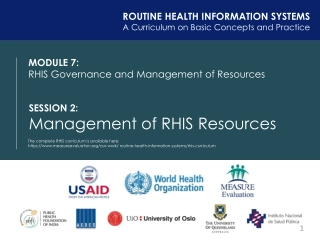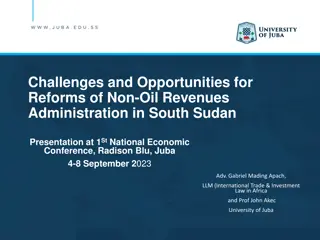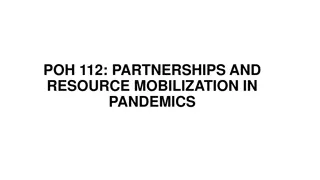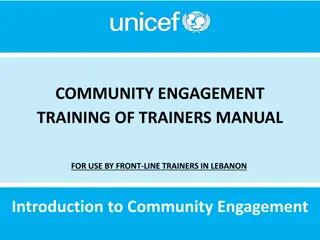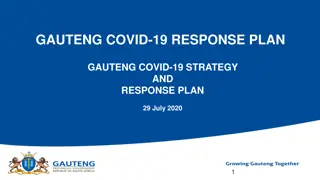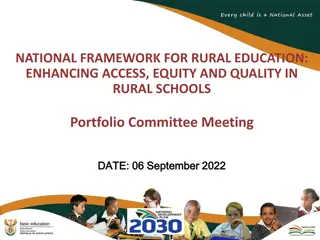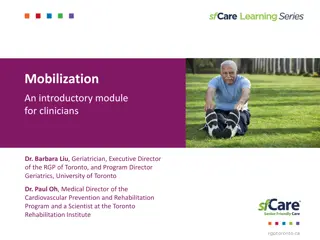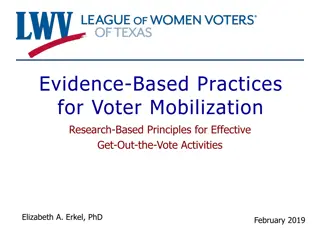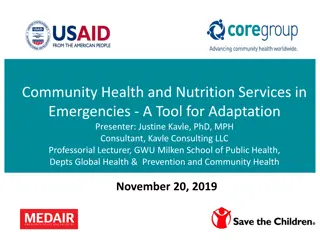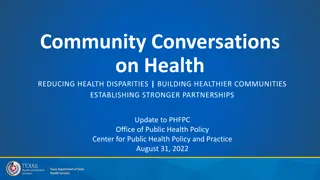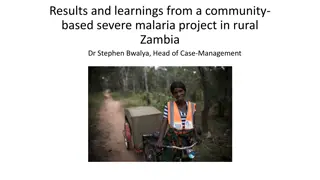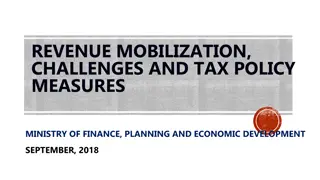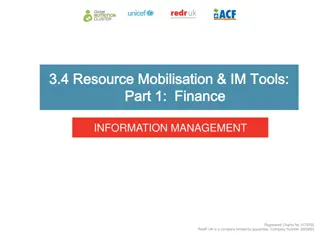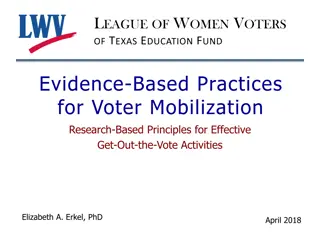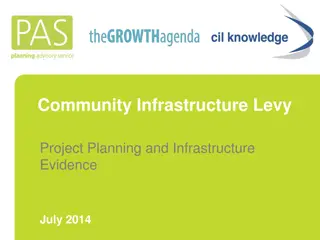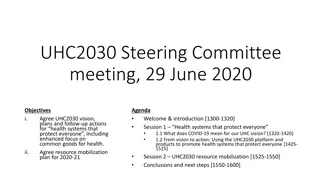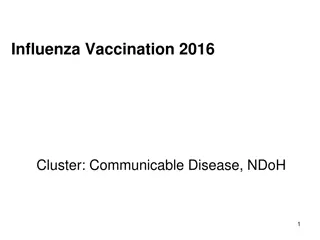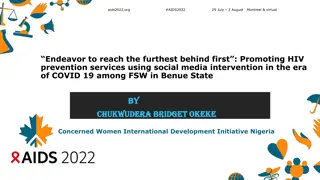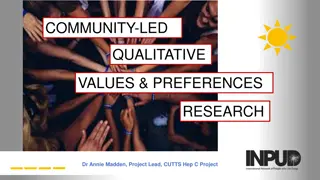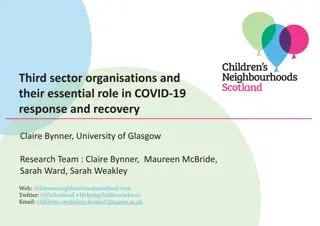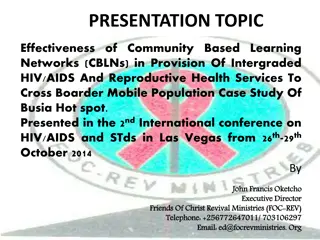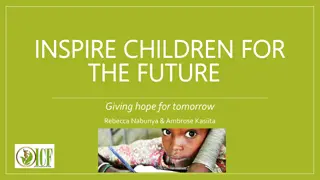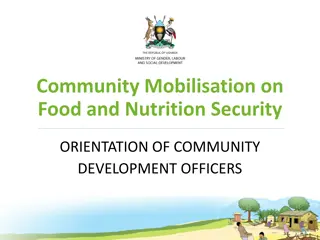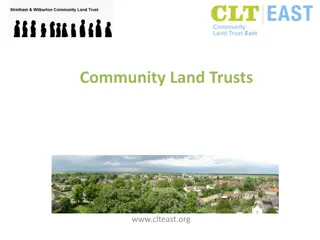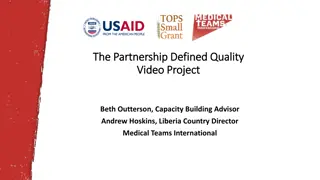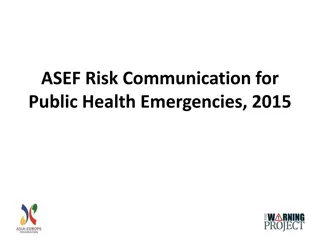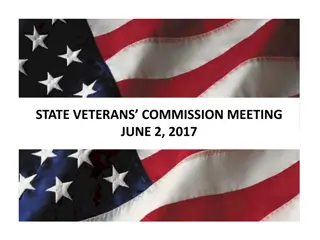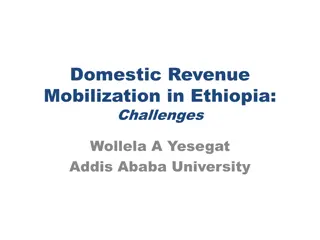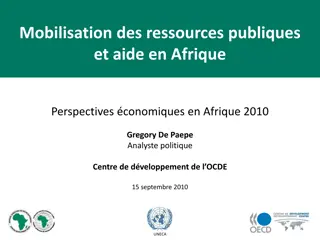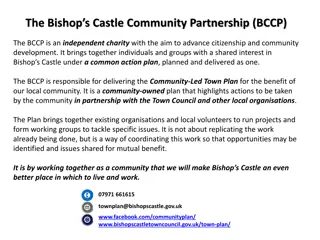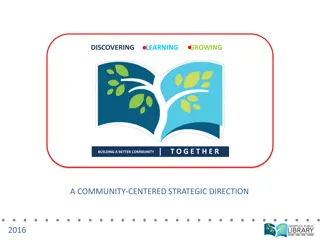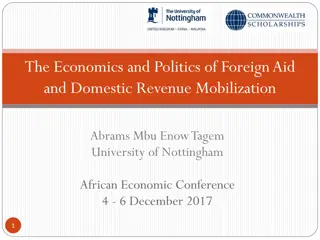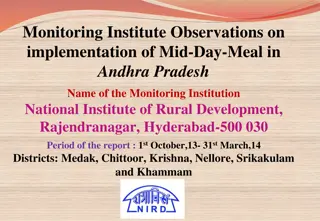Managing RHIS Resources: Governance and Mobilization
Governance and management of resources in routine health information systems (RHIS), covering topics such as human resources, financial resources, and physical resources. Participants will learn about workforce needs, training infrastructure, budgeting, procurement, and maintenance. The module also
1 views • 15 slides
Community Policing Division
The North End Tacoma Community Policing Division operates with the aim of coordinating proactive policing efforts with citizens to ensure safety and security in the community. Led by Captain Christopher Travis, the division comprises two lieutenants, an administrative lieutenant, 16 Community Liaiso
2 views • 40 slides
Efficient Resource Mobilization and Management Strategies by Dr. Abraham Maliet Mamer
This content discusses efficient resource mobilization and management strategies, emphasizing the importance of understanding the typical cycle of resource regime, defining resources, identifying resources, and mobilizing resources effectively. It provides insights into resource allocation methodolo
1 views • 12 slides
Challenges and Opportunities for Reforms of Non-Oil Revenues Administration in South Sudan
The presentation highlights the reliance on oil revenues in South Sudan and the need for reforms in non-oil revenue administration. It discusses sources of non-oil revenue, factors hindering revenue mobilization, and opportunities for reforms to diversify the economy. The objectives of non-oil reven
3 views • 23 slides
University of Toledo Office of Community Engagement and Strategic Partnerships Presentation
Ms. Valerie Simmons-Walston, Special Advisor for Community Engagement and Strategic Partnerships, presents the University of Toledo's commitment to community engagement, its core values, and President Postel's vision for adapting and evolving to positively impact students, faculty, staff, and the co
4 views • 19 slides
Community Health Needs Assessment in Victoria: A Focus on Social Determinants
This project focuses on conducting a health needs assessment in a specific community in Victoria, addressing a significant public health concern within the community. It discusses the social risk factors contributing to the chosen issue, policies, community resources, and the nurse's role in improvi
6 views • 8 slides
Understanding Resource Mobilization for Pandemic Preparedness
This topic delves into partnerships and resource mobilization strategies essential for combating pandemics. Learners will gain knowledge on engaging partners, coordinating resources, and the importance of mobilizing different types of resources such as financial, technical, human, and institutional.
0 views • 18 slides
Community Engagement Training of Trainers Manual for Front-line Trainers in Lebanon
This manual introduces the concept of community engagement, defining what a community is and highlighting its importance. It explores a case study where active community members address health issues through community engagement. The manual emphasizes community-driven development, involvement in dec
0 views • 19 slides
Inter-Cluster Coordination and Information Management in Humanitarian Emergencies
Inter-Cluster Coordination and Information Management play vital roles in humanitarian emergencies. The coordination mechanism involves regular meetings convened by the RC/HC and coordinated by OCHA, providing opportunities for clusters to collaborate on shared planning, needs assessments, and poole
3 views • 13 slides
Gauteng COVID-19 Response Strategy Overview
Gauteng's comprehensive response plan to the COVID-19 pandemic includes a six-pillar strategy focusing on surveillance, contact tracing, healthcare system readiness, designated treatment hospitals, and social mobilization efforts. The Gauteng Department of Health is leading extensive measures encomp
0 views • 24 slides
Enhancing Rural Education: National Framework for Access, Equity, and Quality
The topic discusses the development and approval process of a National Framework for Rural Education aimed at enhancing access, equity, and quality in rural schools. It covers the background, purpose, presentation outline, and the steps taken towards final approval. The framework addresses pillars s
1 views • 35 slides
Mobilization: Importance, Risks, and Recommendations for Older Adults
Encouraging mobilization in older adults is crucial to counteract muscle loss and avoid negative health consequences associated with immobility. This module highlights the impacts of immobility, provides recommendations for mobilization based on frailty status, and offers ideas for promoting mobilit
0 views • 24 slides
Evidence-Based Practices for Effective Voter Mobilization
This tutorial provides research-based principles for effective voter mobilization, focusing on evidence-based practices for Get-Out-the-Vote (GOTV) activities. It covers dos and don'ts of voter mobilization, emphasizing the importance of connecting with voters, using gentle social pressure, and advo
0 views • 20 slides
Community Health and Nutrition Services in Emergencies - Framework for Adaptation
This presentation by Justine Kavle discusses the CHSD Framework Tool designed to plan and adapt community-based health and nutrition interventions for emergency settings. It emphasizes tools for action planning, best practices, and evidence-based approaches to strengthen programs in both humanitaria
2 views • 21 slides
Community Conversations on Health: Reducing Disparities and Building Healthier Communities Update
This update highlights grant activities focusing on reducing health disparities, building healthier communities, and establishing partnerships. It includes current funding activities, top priorities, grant coordination, Texas Public Health Fellowship overview, fellowship host sites, and details for
0 views • 17 slides
Results and Learnings from a Community-Based Severe Malaria Project in Rural Zambia
Zambia's community-based severe malaria project has successfully scaled up the use of Rapid Access to Treatment (RAS) strategy, resulting in improved access to malaria case management services. Key success factors include training over 16,500 Community Health Workers (CHWs) since 2017, community mob
0 views • 9 slides
Uganda's Tax Policy and Revenue Mobilization: Challenges and Measures
The Ministry of Finance, Planning, and Economic Development in Uganda faces challenges in revenue mobilization and implementing tax policy measures. The tax policy aims to generate revenue for budget financing, promote investment and exports, redistribute income, and ensure compliance with regional
0 views • 22 slides
Humanitarian Resource Mobilisation and Information Management Tools
The content discusses the role of Information Management Officers (IMOs) and Cluster Coordinators in resource mobilization within humanitarian settings. It emphasizes the importance of tools such as financial tracking systems, capacity mapping, and checklists in informing the resource mobilization s
0 views • 13 slides
Evidence-Based Practices for Voter Mobilization by League of Women Voters of Texas Education Fund
This guide provides research-based principles and effective strategies for voter mobilization, aiming to enhance voter turnout through evidence-based practices. It covers dos and don'ts of voter mobilization, emphasizing the importance of connecting with voters on a personal level and focusing on th
0 views • 20 slides
Community Infrastructure Levy Project Planning and Infrastructure Evidence
Explore the process of Community Infrastructure Levy (CIL) project planning, learning key insights, setting objectives, selling the benefits of CIL, and understanding the project team structure and resources. Discover the stages and actions involved in CIL implementation, from mobilization to submis
0 views • 25 slides
UHC2030 Steering Committee Meeting Highlights
The UHC2030 Steering Committee meeting held on 29 June 2020 focused on discussing the impact of COVID-19 on the UHC vision and outlining action plans to strengthen health systems. Progress in the first half of 2020 was highlighted, including political momentum, shared UHC goals promotion, community
0 views • 5 slides
Influenza Vaccination Campaign 2016: Aim, Objectives, and Implementation
The Influenza Vaccination Campaign in 2016 aimed to mitigate the effects of influenza by reducing morbidity and mortality, limiting virus transmission, and easing the burden on the healthcare system. The campaign was managed by a National Coordination Steering Committee, with focus on priority group
0 views • 13 slides
Promoting HIV Prevention Services Among Female Sex Workers in Benue State Using Social Media Intervention
Female sex workers in Benue State, Nigeria faced challenges accessing HIV prevention services during COVID-19. To address this, a study utilized social media mobilization to reach and engage them, resulting in increased uptake of HIV testing services (HTS) compared to physical outreach. Through trai
0 views • 10 slides
Community-Led Qualitative Research on LDSS/N Distribution Preferences
Dr. Annie Madden leads a community-led research project focused on the values and preferences of people who inject drugs regarding LDSS/N distribution. The study aims to generate evidence on the feasibility and impact of implementing LDSS/N distribution programs, involving phases from pre-implementa
0 views • 8 slides
Essential Role of Third Sector Organizations in COVID-19 Response and Recovery
This research study by Claire Bynner and the University of Glasgow team focuses on the impact of COVID-19 on families, children, and young people, as well as the response of local third sector organizations in Scotland. The findings highlight the remarkable mobilization of the third sector during th
0 views • 7 slides
Enhancing HIV/AIDS and Reproductive Health Services for Mobile Populations in Busia Hotspot
Community-Based Learning Networks (CBLNs) play a pivotal role in providing integrated HIV/AIDS and reproductive health services to cross-border mobile populations. The case study focuses on the effectiveness of CBLNs in Busia Hotspot, showcasing their mobilization efforts, partnerships with key stak
0 views • 20 slides
Empowering the Future: Inspire Children Project in Uganda
The Inspire Children project in Uganda, led by Rebecca Nabunya and Ambrose Kasiita, aims to empower vulnerable children through education, skills development, and community support. The project focuses on instilling hope, practical skills, and discipline in children for a brighter future. With a vis
0 views • 11 slides
Community Mobilisation on Food and Nutrition Security: Orientation Program for Development Officers
This orientation program aims to equip community development officers with the knowledge and skills to mobilize communities for improving food and nutrition security. Participants will learn about planning community mobilization activities, engaging key stakeholders, conducting dialogue meetings, ho
0 views • 60 slides
Community Land Trusts: Empowering Communities through Collective Ownership
Community Land Trusts (CLTs) are legal entities run by local volunteers to collectively own and manage property/land, undertake development projects, and secure assets for the community. With priorities set by communities to address local issues like affordable housing and recreation, CLTs provide a
0 views • 13 slides
Understanding Partnership Defined Quality (PDQ) Video Project
Partnership Defined Quality (PDQ) is a four-phase methodology that enhances service quality by engaging communities in defining, implementing, and monitoring services. The PDQ video project in Liberia aims to raise awareness about this process. It involves storyboarding, filming community scenes, lo
0 views • 14 slides
Risk Communication for Public Health Emergencies: Prioritizing Strategies
This resource discusses the importance of risk communication in public health emergencies, highlighting key objectives, top priority activities, preparedness levels, and barriers to success. It addresses the need for effective media relations, community engagement, and social mobilization in emergen
0 views • 19 slides
State Veterans Commission Meeting and Mobilization Updates
State Veterans Commission held a meeting on June 2, 2017, discussing current and future unit mobilizations for FY17. The mobilization numbers by unit and month were provided, along with details on ARNG and ANG mobilizations. Additionally, the VISN 4 access data for outpatient appointments and trust
0 views • 33 slides
Challenges in Domestic Revenue Mobilization in Ethiopia
Challenges in domestic revenue mobilization in Ethiopia are attributed to poor tax revenue performance, driven by factors such as the economic structure, dominance of the informal sector, narrow tax base due to tax concessions, and limited tax policy and administration capacity. These challenges hav
0 views • 11 slides
Perspectives on Public Resource Mobilization and Aid in Africa
Perspectives on economic development in Africa in 2010, focusing on the mobilization of public resources and aid. The analysis delves into the importance of resource mobilization, taxation in Africa, and policy options. It also highlights the annual thematic focuses on structural issues such as priv
0 views • 17 slides
Bishop's Castle Community Partnership (BCCP) - Advancing Citizenship and Community Development
The Bishop's Castle Community Partnership (BCCP), an independent charity, works towards advancing citizenship and community development in Bishop's Castle. Through a Community-Led Town Plan and various sustainability projects, the BCCP collaborates with the local community, Town Council, and other o
0 views • 6 slides
Community-Centered Strategic Direction for Building a Better Community
Discovering, learning, and growing together to formulate a community-centered strategic direction in 2016. Leaders focus on what they believe in - connecting, learning, innovating, and collaborating. Their purpose is to inspire the community through enrichment and engagement. Their vision is a vibra
0 views • 6 slides
Economic Relations Division Overview and Achievements
The Economic Relations Division (ERD) is focused on sustainable socio-economic development through managing foreign assistance, implementing national strategies, and strengthening relationships with development partners. Key areas include external borrowing strategy, foreign assistance mobilization,
0 views • 22 slides
The Economics and Politics of Foreign Aid and Domestic Revenue Mobilization
This study explores the relationship between foreign aid, taxation, and domestic revenue mobilization, highlighting the impact of aid on tax/GDP ratios and the constraints faced in revenue systems. It discusses how aid influences policy choices, accountability, and bureaucratic costs, impacting reve
0 views • 25 slides
CNVP: Building Sustainable Agri-Rural and Forestry Development
CNVP focuses on achieving sustainable agri-rural and forestry development through activities related to the Green Economy and the Brown Agenda in the Balkans region. It collaborates with stakeholders from various sectors, applies a team-based approach, and aims to enhance the technical capacity of p
0 views • 22 slides
Observations on Mid-Day Meal Implementation in Andhra Pradesh
The National Institute of Rural Development observed the implementation of the Mid-Day Meal program in Andhra Pradesh from October 2013 to March 2014. The report evaluated aspects such as regularity in serving meals, supply of food grains, transportation arrangements, delivery of cooking costs, menu
0 views • 10 slides
